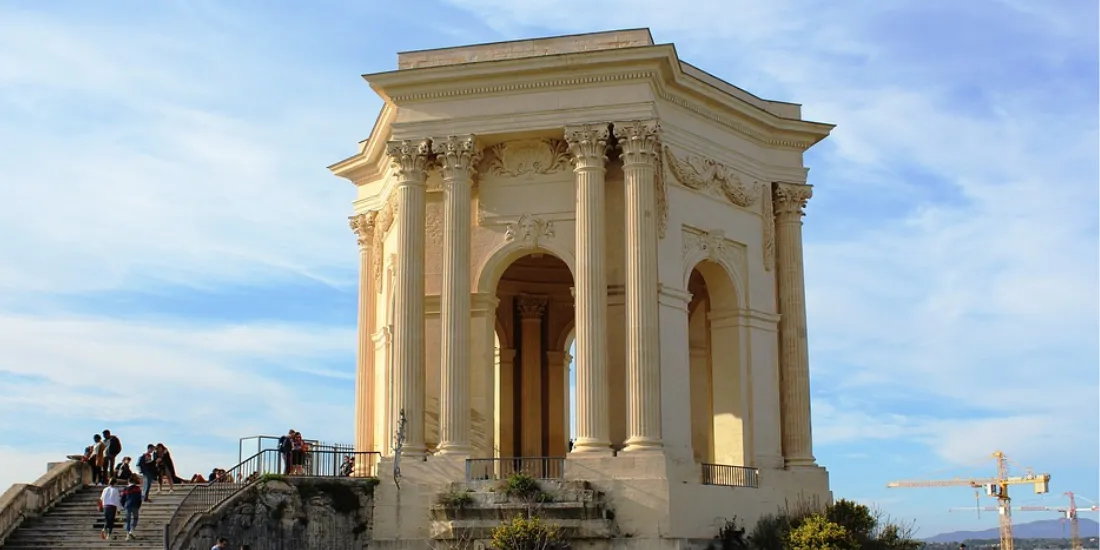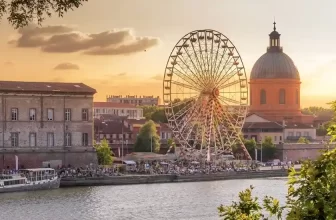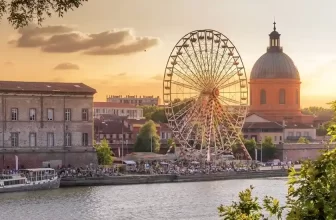
Opening Scene: First Steps in Montpellier
The first thing that hits you when you walk out of Montpellier-Méditerranée Airport isn’t the heat-it’s the smell. A mix of slightly dusty stone buildings baking under the Mediterranean sun, the tang of espresso from a café across the street, and the faint saltiness in the breeze from the coast.
I remember standing just outside the arrivals exit with my overstuffed backpack, already kind of regretting the hoodie I wore on the flight. It was late August-about 30°C (86°F) and dry. Bright blue sky, not a cloud in sight. The palm trees lining the streets swayed like they belonged in a postcard. And even though I was jet-lagged and a bit freaked out, I was grinning. Like, is this really gonna be my life?
Then, the tram pulled up-sleek, electric, quiet. Locals strolled by like nothing was unusual, but I was in full-on wide-eyed mode. You will be too, trust me.
If you’re looking into studying in Montpellier, France in 2026, here’s your real-world guide. Not the sugar-coated, brochure-y stuff. Actual advice you can use. Because knowing the tuition fee structure is one thing-but knowing which café near the uni lets you chill for three hours with one espresso? That’s vital.
Why Study in Montpellier in 2026?
France has always been a solid pick for international study. But Montpellier, specifically? In 2026, it’s kind of having a moment.
First, numbers. Over 70,000 students live in Montpellier, and about 21% are international students. That’s a lot. You won’t feel like the odd one out-almost everyone’s from somewhere else.
Now, France’s new policy updates (yep, this just came out end of 2024): the French government expanded English-taught programs and streamlined visa extensions for graduates staying for work. Meaning 2026 is a pretty smart time to apply.
Also, some real-world benefits:
- Biotech, health science, and IT industries are blowing up here-hello, post-study jobs
- Multiple startups are opening internships through university-linked incubators
- It’s one of France’s most affordable student cities-way cheaper than Paris, let’s be honest
Don’t sleep on the lifestyle either. Montpellier’s got that rare combo: coastal vibes, historic charm, university-town energy. It’s not flashy, but it’s alive. Picture open-air cinemas in summer, swing dances at Place de la Comédie, 3€ wine tastings in tight alleys that feel like scenes from a movie. You’ll walk a lot, maybe get a bike, and end up knowing all the shortcuts through the old city.
And if you’re chasing balance-solid academics, career opportunity, and a livable city-you’ll get all three in 2026 here.
What Makes Montpellier Special for International Students?
Honestly, Montpellier feels built for students. Like, everything revolves around student life. The city has seven major universities and institutions, all closely connected-not just logistically, but socially, culturally, mentally.
Quick snapshot:
- One in four residents is a student
- The city runs free French lessons for internationals
- Dozens of student discounts on transport, museums, food, even mobile plans
- Tons of student support services-orientation programs, housing help, legal aid
But here’s the thing most students don’t expect: locals are chill with internationals. Like, you won’t be side-eyed for speaking broken French at the boulangerie. Montpellier is young. It’s open. And it’s used to people coming from literally everywhere.
My roommate from Tunisia got her first internship through a campus job fair. A Vietnamese friend got housing support from CROUS (a public student services org) even before she landed. Stuff just works here.
And compared to cities like Lyon or Paris, there’s less competition for campus jobs and internships-more opportunity, less burnout.
Top Universities and Colleges in Montpellier
Okay, this is where most of your time will be spent, right? Here’s the breakdown of Montpellier’s main institutions.
Université de Montpellier (UM)
- Known for: Sciences, Medicine, Engineering
- Global Ranking: Top 300 (QS, 2025)
- Tuition: ~€2,770/year (Bachelor’s); €3,770/year (Master’s) for non-EU students
- Campus vibe: Mature, research-driven, down-to-earth. Campus is split into themed zones (science, law, health).
- Cool fact: Founded in the 1200s-but has a high-tech med faculty and biotech labs linked to actual hospitals.
Montpellier Business School (MBS)
- Known for: Business, Finance, Sustainability, Entrepreneurship
- Ranking: Top 15 business schools in France (Financial Times)
- Tuition: €11,000–€15,000/year for internationals
- Vibe: Corporate-leaning but super international-70+ nationalities on campus. Professors are more hands-on than you’d expect.
- Tip: Look into their scholarship matching program. Up to 50% off for merit and need-based cases.
Paul Valéry University – Montpellier III
- Known for: Literature, Humanities, Arts, Languages
- Tuition: ~€2,770/year (non-EU)
- Campus: Tree-lined, Instagrammable, and slightly chaotic during exam weeks. Feels like a creative space, not a rigid academic bubble.
- Vibe: Think poetry slams and political debate societies. If you’re into cultural studies, this is your place.
Montpellier SupAgro (now part of Institut Agro)
- Known for: Agriculture, Sustainability, Environmental Sciences
- Tuition: Varies (around €3,000–€5,000)
- Cool bit: Focuses on green innovation and food tech-has experimental farms accessible to students.
- Pro tip: Tons of Erasmus and exchange students land here.
École Polytechnique Universitaire de Montpellier (Polytech Montpellier)
- Field: Engineering (mechanical, IT, water sciences, electronics)
- Tuition: €3,770/year for non-EU
- Campus: Modern set-up, part of the French Grandes Écoles network
- Vibe: Intense but rewarding. Known for collaborative projects and real industry mentorships.
ENSCM – National School of Chemistry
- Focus: Advanced Chemistry and Material Sciences
- Tuition: ~€3,000–€5,000/year for internationals
- Vibe: Small, specialized, fiercely academic but deeply collaborative
Top Student Accommodation in Montpellier
Here’s the thing about housing in Montpellier: it fills up fast. Most students don’t realize how competitive it gets until it’s too late.
CROUS Residences (Public Student Housing)
- Cost: €250–€400/month
- Proximity: Near major campuses
- Pros: Cheap, secure, built-in student community
- Cons: Spartan rooms. Get used to shared bathrooms. Apply early-like months early.
UXCO Student Residences
- Cost: €500–€700/month
- Pros: All-inclusive: furnished rooms, Wi-Fi, gym, co-working areas
- Cons: Slightly pricier
- Locations: Close to MBS and SupAgro campuses
- Pro tip: Book in spring before everyone else floods their inbox
Flatshares (colocations)
- Cost: ~€400–€600/month
- Best for: Social life, saving money, getting integrated faster
- Apps to find them: Appartager, La Carte des Colocs
- Note: French roommates will greet you with cheek kisses eventually-get used to it.
Private Studios
- Cost: €600–€800/month
- Pros: Privacy, good for final year students or solo vibes
- Cons: Utilities often separate, no “community” feel
Best Neighborhoods for Students in Montpellier
Each area feels like its own world. Here’s where students usually end up:
Centre Historique (Ecusson)
- Rent: €500–€750 for a studio
- Distance: Central-you’ll walk to campus, usually
- Vibe: Cobbled streets, street performers, cozy cafés. Social as hell. Sometimes noisy.
- Tip: Great if you love being in the middle of everything.
Port Marianne
- Rent: €600–€800
- Distance: 10 minutes by tram to UM or MBS
- Vibe: Modern buildings, near riverside walks, quieter and cleaner
- Ideal for: Master’s students, couples, people who like a balance of quiet and accessibility
Antigone
- Rent: €550–€700
- Vibe: Greek-inspired architecture, big open plazas, and cheap eats
- Pros: Right on Tram Line 1. Near malls, gyms, and student co-ops
Beaux-Arts
- Rent: €450–€600
- Vibe: Chill, slightly artsy. Less touristy, full of students. Great wine bars and bakeries.
- Drawback: Slightly farther on foot
Cost of Living in Montpellier (Real Budget Breakdown)
This one’s important-probably the most important if you’re planning long-term. Good news first: Montpellier is one of the cheapest major student cities in France. Not dirt cheap, but manageable with a little planning.
Here’s what a realistic monthly budget looks like in 2026:
| Expense | Low Budget (€) | Mid-Range (€) | Comfort (€) |
| Accommodation | 250–400 | 500–700 | 750+ |
| Food & Groceries | 160–220 | 250 | 350 |
| Transport (student card) | 30 | 30 | 30 |
| Phone & Internet | 20–35 | 40 | 50 |
| Entertainment/Socializing | 50–100 | 150 | 300+ |
| Books/Supplies | 30–50 | 60 | 100 |
| Health Insurance | Often covered | 30–50 | 50+ |
| Miscellaneous | 50 | 80–100 | 150+ |
Estimated Monthly Total:
- Tight budget: €600–€750
- Comfortable budget: €850–€1100+
Money-saving tips:
- CROUS cafeterias offer meals for just €3.30
- Buy a monthly TAM transport pass for €30 (unlimited bus/tram access)
- Visit open-air markets (Les Arceaux, Mosson) for fresh, cheap produce
- Hang out at Place de la Comédie and not pricey cafes
- Use the Erasmus student card and Youth Mobility apps for crazy discounts
Common financial traps:
- Takeout food adds up fast. Like “where did my scholarship go?” fast.
- Mobile plans seem cheap, but read the fine print-French telecoms love hidden fees
- Nightlife is cheaper than Paris… but still budget for it. Thursday nights in Montpellier are a thing.
Scholarships and Financial Aid
Yes, studying abroad can be expensive-but don’t assume you’ll have to pay full tuition. There’s actually decent financial aid for international students in Montpellier-you just need to know where to look.
1. French Government Scholarships
- Eiffel Excellence Scholarship: For master’s/PhD students. Covers monthly allowance (€1,181+), tuition, travel, and more.
- Administered by Campus France: campusfrance.org
2. Erasmus+ Grants
- For students doing a semester or year abroad from a partner university
- Covers travel + living costs in Montpellier
3. University-Based Scholarships
Most local universities offer merit and need-based support:
- Université de Montpellier Excellence Grants (up to €5,000)
- MBS Diversity Scholarship (up to 50% tuition reduction)
- Paul Valéry Master’s Aid Package
Application deadlines are usually February to April 2026-start early.
4. Regional/Private Options
- Occitanie Region funding: Available for low-income backgrounds
- Fulbright (for US students) or DAAD (for Germans) may cover studies here
Insider scholarship tips:
- Write a personal statement that connects your education goals to local regional development (France loves that)
- Don’t recycle generic essays. Mention actual professors, programs, or Montpellier-specific experiences.
- Ask your current professors for strong, detailed recommendations
- Use platforms like ScholarshipPortal or Campus Bourses
Step-by-Step Guide: How to Apply in 2026
Here’s the simplified process without the bureaucratic fog.
Step 1: Research & Shortlist (Oct–Dec 2025)
- Use Campus France for verified program listings
- Check if the uni requires APPLYING via Parcoursup (French public system) or direct
- Bookmark: etudier-en-france.fr
Step 2: Prepare Documents (Jan)
You’ll usually need:
- Passport
- Academic transcripts
- Language cert (DELF/DALF or TOEFL/IELTS for English-taught ones)
- Statement of Purpose (don’t fake AI it-seriously)
- Letters of Rec (2 minimum)
Pro tip: Have docs translated officially in French if required. The French love paperwork (and stamps).
Step 3: Submit Application (Jan–Mar)
Deadlines can vary:
- Most master’s: February–mid March
- Bachelor’s: sometimes early February (esp. public unis)
Watch those dates.
Step 4: Interviews / Offers (April–May)
Some programs do Zoom interviews.
Decisions can take 4–8 weeks. Yes, it’s slow. Yes, it’s normal.
Step 5: Accept Offer & Apply for Visa (May–June)
Once in, pay deposit and request a pre-admission certificate-you’ll need it for your visa.
Step 6: Accommodation & Health Insurance (July)
Book early-especially CROUS or student residences. Most start taking students before August.
Visa and Work Rules (2026 Edition)
The visa you’ll need:
✔️ VLS-TS (Visa Long Séjour – Titre de Séjour)
Valid for 1 year, renewable in France, doubles as a residence permit
Application Process
- Apply via Etudes en France portal or your local French consulate
- Book visa appointment fast-it gets packed in summer
- Show:
- Proof of admission
- Financial proof (minimum €615/month income)
- Accommodation address
- Travel insurance
- Language certificate (if asked)
Processing time: 3–6 weeks
Cost: ~€99 visa fee
Can you work on a student visa?
Yup.
- 20 hours/week (part-time) during uni sessions
- Full-time during holidays
- Must get a work contract for anything formal
Internships count separately.
After Graduation?
France allows a 1-year “job search/residence permit” extension for grads seeking work post-study.
- If you land a work contract (CDI or CDD), you can switch to a “Talent Passport” visa
- Big areas hiring right now: IT, biotech, engineering, business consulting, agri-environmental tech
Transport: Getting Around Montpellier
Montpellier’s public transport is… kind of amazing. And it’s student-budget-friendly.
Transport Options:
- Tram (TAM network) – Main lines (1–4) cover 90% of student life
- Bus network – For slightly farther suburbs
- Bikes (veloMagg’) – Cheap rental bikes across the city
- Walking – Literally everything in the old city is walkable
Monthly Student Pass:
- €30/month unlimited
- Discounts for under-26s
- App to download: M’Ticket TAM – tram/bus access with QR code
Pro tip: Avoid taking cabs unless stranded-Uber exists but prices surge hard in festival season.
Student Life, Food, and Daily Culture
Let’s talk about what your actual daily life might look like.
Typical Day for a Student:
Morning lecture at 9, café break at 11, lunch at CROUS Cafeteria (which serves chicken curry?? surprisingly decent), study sesh at Bibliothèque Universitaire, early evening tram to Plage Carnon when it’s warm, or cheap wine in Antigone if it’s winter.
Campus Vibe:
- Super social, less “suit-and-tie” than UK/US campuses
- Classes aren’t always interactive (the French system is more old-school), but clubs, sports, and societies make up for it
- No “frat” stuff, thank god
Food Culture:
- Street kebabs and falafel (€3–5)? Staples.
- Cafés like Le Gazette or Coffee Club double as study havens
- Try “tielle”-a spicy octopus pie. Sounds weird. Just try it.
Weekly Culture:
- Free jazz nights at Jam Club
- Techno parties near the Rives-du-Lez
- Farmer’s market Sundays, open-air cinema in summer at Domaine d’O
Adjustments:
- People eat later. Like, 8:30–9pm dinners. Eat snacks.
- The bureaucracy sucks. Be patient. Bring extra photocopies of everything.
- Social life is easy if you speak even a little French. Otherwise? Learn. It matters.
Career Opportunities After Studying
No lie-the job market’s tight in France, but Montpellier students are landing roles if they’re proactive.
Local Internship Scene
- Biotech + Healthcare: Firms like Horiba, Sanofi, and regional health labs
- IT: Startups in the Montpellier Technopole. Python skills? You’re golden.
- Environment/Agritech: SupAgro grads crush it
Finding Jobs:
- Use university career portals (Moodle, Ent)
- LinkedIn + Welcome to the Jungle.fr (great for local roles)
- Use job fairs at MBS or Paul Valéry
Short-Term Study Abroad Options
Maybe you’re not ready for 3 years in France? There are still cool options.
- Summer Schools at UM and MBS
- Short programs in Sustainability, Digital Marketing, French Culture
- Typical Duration: 2-6 weeks
- Cost: €1500–€3500 including housing
Best for:
- Gap year students
- Language hoppers
- Applicants trying to “test-drive” a French education system
Application Timeline for 2026
Here’s a month-by-month planner:
- Oct 2025 – Research programs, start email convos with schools
- Nov–Dec 2025 – Take IELTS/TOEFL if needed
- Jan 2026 – Gather documents, translate transcripts
- Feb–March 2026 – Major application window
- April–May – Offers roll in. Prepare financial proof
- June – Visa appointments + health check
- July – Book accommodation
- August – Pack your bags
- September 2026 – Orientation week begins!
Public vs Private Universities
| Feature | Public Universities | Private Schools (e.g. MBS) |
| Tuition (per year) | €2,770–€3,770 | €10,000–€15,000 |
| Admission | Competitive but open | Application + interviews |
| Class Size | Large lectures | Small, personalized |
| Programs | Broad range, research-heavy | Focused on business/tech |
| Prestige/Research | High in sciences | High in business |
| Scholarships | Govt/French aid | Internal bursaries |
| Student vibe | Independent vibe | Structured support system |
Final Thoughts – Why Montpellier Might Be Perfect for You
Montpellier is easy to fall in love with-which is exactly why you need to look at it clearly. It’s not glitzy. It doesn’t have the Eiffel Tower. And sometimes the tram drivers are on strike.
But it’s real. It’s affordable-ish. It gives you a top-tier French education without crushing debt. You’ll meet students from everywhere and odds are your French will get pretty decent.
It’s perfect if you…
- Like a mid-size, human-scale city
- Want solid programs in science, humanities, business, or agri-tech
- Value lifestyle as much as lectures
Not ideal if you…
- Need daily English-speaking everything
- Crave a massive capital-city buzz
First-year tips?
- Apply early-housing goes fast.
- Learn some French now-it changes your experience.
- Don’t overpack. You’ll buy local clothes (and regret it if you don’t).
- Ask older students everything. There’s no shame.
- Have €1,000 saved before arrival. Trust me.
Top FAQs About Studying in Montpellier
Not really. It’s one of the more affordable French cities. Budget €700–€1000/month (including rent).
Yep-up to 20 hrs/week on your student visa.
For daily life, yes-it helps. Many programs are in English, but French opens doors everywhere.
Pretty safe. Pickpocketing happens downtown, but violent crime? Super rare.
Yes-you can apply for a one-year post-study visa to job hunt.
Definitely, especially through Campus France or your specific university.
Start researching by October 2025, submit by Jan–March 2026. Earlier is better.






